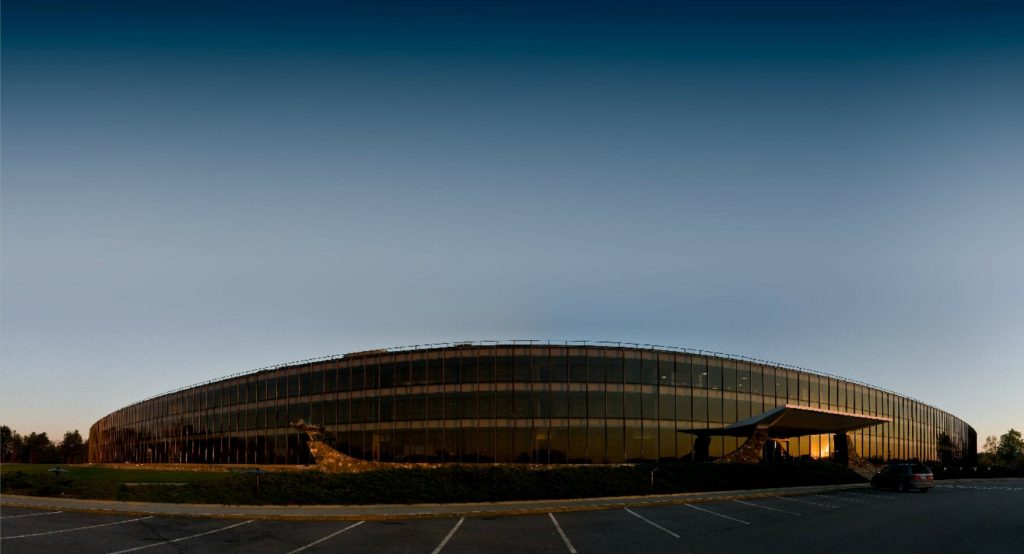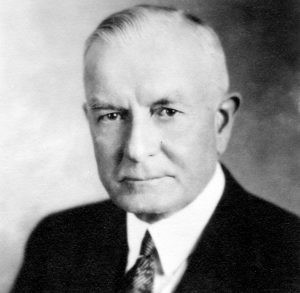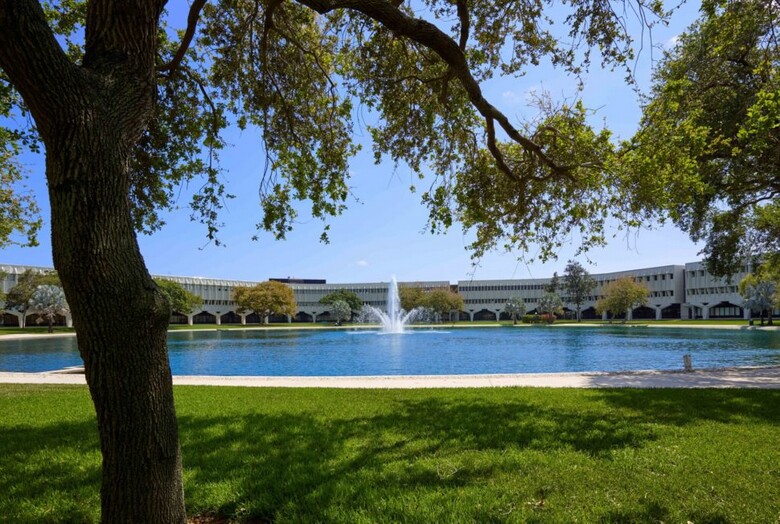“When you quit school in ninth grade and you’re smart, you spend your life in some small or large way proving yourself” – George Carlin
I interviewed for a lead programmer position at IBM Research, based mainly on some helpful improvements I had made to IBM’s CP-67 operating system when I worked for Continental Insurance. Unlike Carlin, I waited until my high school senior year to drop out.
From Wikipedia, edited for length: The Yorktown Heights building, housing the headquarters of IBM Research, is a large crescent-shaped structure consisting of three levels with 40 aisles each, radiating out from the center of the crescent. Due to this construction, none of the offices have windows. The lowest level is partially underground in some areas toward the shorter side of the crescent, which also leads to the employee parking lots. A large overhang protrudes from the front entryway of the building, and faces the visitor parking lot.
I was going to start off by saying “everybody here is a self-serving jerk”. Well, of course that’s an exaggeration, but there are very few team players in Yorktown. Most people are more interested in advancing their own career.

Thomas J. Watson Research Center
To give you an idea of the attitude at Yorktown, a local doctor visits the site twice a week to do pre-employment physicals. Arriving mid-morning, he always has difficulty finding a spot in the visitor parking lot, and as a courtesy the company installs a “DOCTOR PARKING” sign in the spot closest to the front door. The sign doesn’t improve things for the doctor; the space is always taken when he arrives. One parker, a PhD of course, when questioned responds that he is a doctor, so what’s the problem? In my imagination I see dozens of proud PhD’s setting their alarms for four o’clock in the morning to get to that spot of honor first. The sign is removed, and a week later replaced by one that says “MEDICAL DOCTOR PARKING”.

Thomas J Watson Sr
Company rules are more relaxed here. At most IBM sites, drinking at lunch would be unthinkable. Founder T.J. Watson had a strict no-alcohol policy, and that included drinking at home. When our small department first goes out to lunch and the waiter asks “What will you have to drink?”, all eyes go to our manager, we expect him to take the lead, we will follow. He replies “Bottle of Sam Adams, please” and now we are free to have a beer too.
The four of us on our project team usually have lunch together in one of the local restaurants. The other three are various degrees of beer snob; they drink the latest trendy or exotic brews. I usually order a Budweiser just on general principle. When the snobbiest of them mocks my choice, I say “Just because Bud is the most popular beer in the world doesn’t mean it isn’t any good.” He also sneers at the idea of playing the lottery. On my mental list of things to do when I win The Big One is send him a case of Budweiser longnecks. He’s fun to troll.
When I go to the Poughkeepsie site for a week of classes, I am steered to a nearby restaurant frequented by IBMers. I sit alone in a booth wearing my IBM badge, the wearing of which comes as naturally as wearing a wristwatch. I surprise the waitress by ordering a bottle of beer; she smiles as though she’s just seen the cutest puppy ever running around her feet. While I have my lunch, people seem to walk by just to look at me, they see an IBMer daring to have a beer during the working day. They glance at my badge, not to take down my name but to learn what site this rara avis comes from.
If you visit Yorktown, you may hear one or the other of two fictional characters being paged over the PA system, Captain Strang and Mr. Sassoon. Yorktown is more than a computer lab, it’s a wet lab that uses hazardous substances, and accidents happen. An announcement “Captain Strang, aisle 24, level one” means there is a FIRE! in aisle 24, level one, and an internal firefighting squad, or squads, respond. The words “Captain Strang” have an attention-getting bite designed to cut through any absent-minded reverie; say it out loud when you are alone. (Say it out loud three times in front of a mirror and who knows what will happen.)
A page for “Misssster Sassssoooon” mimics the hiss of a gas leak, another site hazard, summoning a squad in protective gear. There are dozens of compressed-gas tanks, large and small, behind the building. One cool thing to watch is a delivery of liquid nitrogen, which creates a stagecraft-like London fog on the parking lot.
In the auditorium there are occasional “brown bag lunches” that anyone can attend. Similar to a TED talk, they feature a presenter knowledgeable in computing or some other science. Today, the presenter is Linus Pauling, who in 1955 won the Nobel Prize in Chemistry. The doctor is briefing us on research he’s doing in his new area of interest, the structure of the human brain. His experiments require large numbers of cat cortexes, that is, cat brains. A concerned woman questions Pauling closely about how the cats are obtained, how they are treated in life, and how they are put to death.

Mandelbrot pattern
The only famous scientist I ever met personally here is Benoit Mandelbrot, IBM Fellow and father of fractal geometry. One day he steps up to the urinal next to mine and nods in greeting; I nod back.
In many cases a project is pure research, there is no product and there never will be a product. A newly-minted manager has the temerity to caution a research staff member about stretching his lunch break into two hours on the tennis courts every day. The response is “Yes, but while I’m playing, I’m still thinking.”
There is a basic impracticality to some of what we do here The idea behind the project I am part of is to prove that eight $200,000 midrange computers can cleverly share a workload and take the place of one $3,000,000 mainframe computer. Once it started becoming clear that yes, yes we can, someone in authority did the basic arithmetic in light of the reality that we are here to make money for IBM, not to save money for the customer. The project was killed. In today’s world I would be sent home with my personal belongings in a cardboard box, but in 1986 I am encouraged to check the internal job listings for another position inside the company.
I find a listing in Boca Raton that might be a match. I arrange an interview and fly out of LaGuardia on a miserable, slushy January day. When we land in Florida, and I get my first look at the pure lushness of it, I know how Ponce de León must have felt. I admit to myself “I’m probably going to take this job no matter what.”

IBM Boca Raton
People hold high opinions of Yorktown. When my wife and I start looking for a house in Boca, our real-estate agent happens to mention that her husband holds some sort of senior position here in Boca. Later, when she’s alone with my wife, the quiz begins. She tries to guess, where in New York had I worked? Poughkeepsie? Fishkill? She guesses other sites in the Hudson Valley but comes up dry. She finally gives up, and asks the question straight out. When my wife (always my biggest fan) says “Yorktown”, the agent is surprised and dispirited. One-upped, she improvidently volunteers that her husband had always wanted to work there, but couldn’t get an interview.
People in Boca think it odd that anyone would ever leave fabled Yorktown Research. My new friend Rafael asks what it was like working there. He knows I was not happy. I think for a while, then ask if he remembers the smartest kid in his school, and what that person was like? He nods, and I go on. “Okay, imagine there are 2000 people in this room and they went to 2000 different schools. Now imagine that the smartest kid from each of those schools all went to work at the same place.” He understands.
While my family is getting relocated to Boca, our rental apartment and groceries are paid for by the company. After I turn in my first expense voucher, with all supporting documentation, I get a call from a person in accounting, who informs me “We’ll pay for your groceries, but you have to pay for your Heineken yourself.”

Comments are closed.